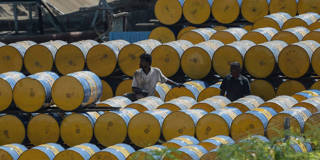Western governments have struggled with the challenge of reducing Russia’s oil-export revenues, because the impact of their boycotts is offset by higher prices and purchases elsewhere. By establishing a buyers’ cartel to impose a price cap on Russian crude, the West could achieve its goal with the support of oil importers everywhere.
STOCKHOLM – The Western sanctions on Russia over its aggression against Ukraine are growing tighter. The biggest outstanding concern is how to cut Russia’s oil revenues, which may now account for over half of its export revenues. The best method is a price cap for oil, which is already being implemented – though not by Western countries.
The initial idea was that the West would stop importing Russian oil. But because Russia accounts for roughly 11% of global oil production, Western attempts to reduce oil imports from Russia led to sharp price hikes on the world market, allowing Russia to earn more from its oil exports, while delivering smaller volumes.
Some countries, notably India, China, and Turkey, have increased their oil imports from Russia. But they have not necessarily helped Russia much, because they have bought this oil at a large discount. At the beginning of 2022, Russia’s Urals crude was sold at a minor discount of $1-2 per barrel, relative to the European Brent standard. Since April, however, this discount has hovered between $31-36 per barrel. On August 3, the Urals crude oil price was $76 per barrel.

STOCKHOLM – The Western sanctions on Russia over its aggression against Ukraine are growing tighter. The biggest outstanding concern is how to cut Russia’s oil revenues, which may now account for over half of its export revenues. The best method is a price cap for oil, which is already being implemented – though not by Western countries.
The initial idea was that the West would stop importing Russian oil. But because Russia accounts for roughly 11% of global oil production, Western attempts to reduce oil imports from Russia led to sharp price hikes on the world market, allowing Russia to earn more from its oil exports, while delivering smaller volumes.
Some countries, notably India, China, and Turkey, have increased their oil imports from Russia. But they have not necessarily helped Russia much, because they have bought this oil at a large discount. At the beginning of 2022, Russia’s Urals crude was sold at a minor discount of $1-2 per barrel, relative to the European Brent standard. Since April, however, this discount has hovered between $31-36 per barrel. On August 3, the Urals crude oil price was $76 per barrel.